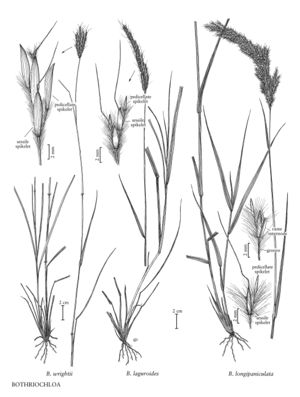Difference between revisions of "Bothriochloa longipaniculata"
FNA>Volume Importer |
imported>Volume Importer |
||
| (4 intermediate revisions by 2 users not shown) | |||
| Line 7: | Line 7: | ||
|synonyms={{Treatment/ID/Synonym | |synonyms={{Treatment/ID/Synonym | ||
|name=Bothriochloa saccharoides var. longipaniculata | |name=Bothriochloa saccharoides var. longipaniculata | ||
| − | |authority= | + | |authority= |
| + | |rank=variety | ||
}} {{Treatment/ID/Synonym | }} {{Treatment/ID/Synonym | ||
|name=Andropogon saccharoides var. longipaniculata | |name=Andropogon saccharoides var. longipaniculata | ||
| − | |authority= | + | |authority= |
| + | |rank=variety | ||
}} | }} | ||
|hierarchy=Poaceae;Poaceae subfam. Panicoideae;Poaceae tribe Andropogoneae;Bothriochloa;Bothriochloa longipaniculata | |hierarchy=Poaceae;Poaceae subfam. Panicoideae;Poaceae tribe Andropogoneae;Bothriochloa;Bothriochloa longipaniculata | ||
| Line 23: | Line 25: | ||
-->{{Treatment/Body | -->{{Treatment/Body | ||
|distribution=Tex.;Miss.;La. | |distribution=Tex.;Miss.;La. | ||
| − | |discussion=<p>Bothriochloa longipaniculata grows at 2-200 m, along roadsides and in fields, open woodlands, disturbed ground, and swales of the Gulf coastal prairie, often in heavy clay soil. Its range extends from southern Texas and Louisiana to northeastern Mexico and possibly Panama.</p> | + | |discussion=<p><i>Bothriochloa longipaniculata</i> grows at 2-200 m, along roadsides and in fields, open woodlands, disturbed ground, and swales of the Gulf coastal prairie, often in heavy clay soil. Its range extends from southern Texas and Louisiana to northeastern Mexico and possibly Panama.</p> |
|tables= | |tables= | ||
|references= | |references= | ||
| Line 32: | Line 34: | ||
-->{{#Taxon: | -->{{#Taxon: | ||
name=Bothriochloa longipaniculata | name=Bothriochloa longipaniculata | ||
| − | |||
|authority=(Gould) Allred & Gould | |authority=(Gould) Allred & Gould | ||
|rank=species | |rank=species | ||
| Line 39: | Line 40: | ||
|basionyms= | |basionyms= | ||
|family=Poaceae | |family=Poaceae | ||
| − | |illustrator=Linda A. Vorobik | + | |illustrator=Linda A. Vorobik;Hana Pazdírková |
| + | |illustration copyright=Utah State University | ||
|distribution=Tex.;Miss.;La. | |distribution=Tex.;Miss.;La. | ||
|reference=None | |reference=None | ||
| Line 45: | Line 47: | ||
|publication year= | |publication year= | ||
|special status= | |special status= | ||
| − | |source xml=https:// | + | |source xml=https://bitbucket.org/aafc-mbb/fna-data-curation/src/200273ad09963decb8fc72550212de541d86569d/coarse_grained_fna_xml/V25/V25_1554.xml |
|subfamily=Poaceae subfam. Panicoideae | |subfamily=Poaceae subfam. Panicoideae | ||
|tribe=Poaceae tribe Andropogoneae | |tribe=Poaceae tribe Andropogoneae | ||
Latest revision as of 17:57, 11 May 2021
Culms 60-150(200) cm tall, 2-4 mm thick, robust; nodes glabrous or shortly hirsute. Leaves cauline, evenly distributed, glabrous, dark green; ligules 2.5-3 mm; blades 12-20 cm long, (3)4-7 mm wide, flat to folded. Panicles 9-20 cm, narrowly lanceolate, silvery-white or light tan; rachises 7-15 cm, with numerous branches; branches 3-5 cm, shorter than the rachises, erect, without axillary pulvini, with multiple rames; rame internodes with a membranous groove wider than the margins, margins copiously hairy, hairs 3-8 mm, at least somewhat obscuring the spikelets. Sessile spikelets (3)3.5-4.5 mm, narrowly ovate to lance¬olate, shiny green, apices acute; lower glumes hirtellous on the lower 1/2, hairs shorter than 0.8 mm, lacking a dorsal pit; awns 9-14 mm; anthers 1-2 mm. Pedicellate spikelets 1.8-2.8 mm, sterile. 2n = 120.
Distribution
Tex., Miss., La.
Discussion
Bothriochloa longipaniculata grows at 2-200 m, along roadsides and in fields, open woodlands, disturbed ground, and swales of the Gulf coastal prairie, often in heavy clay soil. Its range extends from southern Texas and Louisiana to northeastern Mexico and possibly Panama.
Selected References
None.
